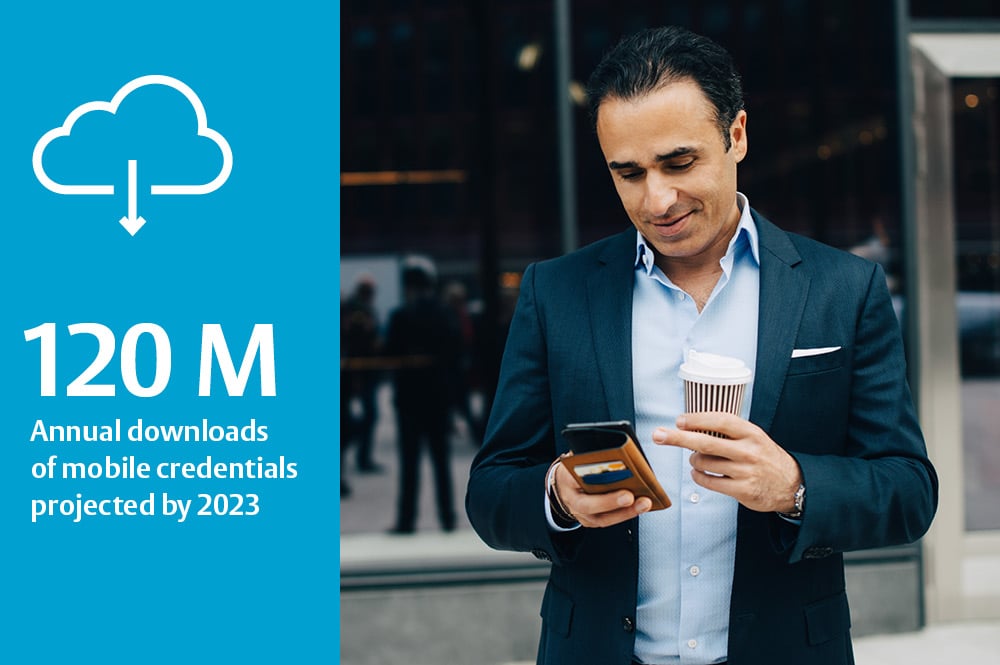The smartphone has already revolutionised key use and security management


James Thorpe
Share this content
Mobile access is impacting how we interact with buildings and manage their security. For users, a device they already carry unlocks doors and other openings digitally. For facility managers, this same device manages access more securely, for multiple sites if required. Businesses benefit from time-saving security management at a lower total cost.
Nearly two-thirds of organisations have already adopted mobile access control — or plan to within two years. According to analysts Omdia, mobile credential downloads grew by 220% between 2018 and 2019. An estimated 120 million will be on phones globally by 2023. This growth will continue, driven by the convenience, cost and security benefits.
The security of mobile credentials improves on smart-cards and fobs. Biometrics are built into almost every modern smartphone, via fingerprint and face ID unlocking. Human behaviour is also on the smartphone’s side. How quickly would a student or employee notice a lost plastic access card? Everyone is more careful with their phone.
More secure, more convenient
For users, convenience benefits are obvious — and have already ushered in a mobile revolution in banking, travel booking, food delivery and many more sectors. Yet not all solutions are created equal, especially in a field as sensitive as security: The user’s experience and privacy are both critical considerations.
Mobile access via battery powered Aperio locks, for example, is built on Seos, a platform with cryptography and privacy protection. Unlocking any opening secured with an Aperio device is easy and intuitive: Users simply present their phone at the RFID reader, just as they would a smart-card. They don’t even need to open an app.
Aperio locks are already compatible with all major RFID credentials and NFC. The Aperio E100 Electronic Escutcheon is also compatible with Bluetooth Low Energy — and more Aperio devices will support Bluetooth in the near future. User experience at the door is always identical for any credential.
Businesses can run RFID and mobile in parallel, if they choose. Every technology is always inside the Aperio package: There is no need to decide at purchase. And because Aperio is built on an open platform for maximum compatibility, locks integrate seamlessly with over 100 different security and access control systems.
Managing access efficiently with a smartphone
For facility managers, security, cost and convenience are all enhanced by mobile. Lost physical credentials pose a major threat to workplaces. Over 17% of respondents to one survey admitted losing an RFID card or fob in the previous 12 months. Mobile credentials can be cancelled or amended over the air, without any need for updaters or a credential handover meeting. Nobody is left waiting for their access permissions to update or their old card to be cancelled.
At Arkansas State University’s new campus in Mexico, for example, the SMARTair Openow mobile access solution enables management of virtual “keys” inside a secure app. Keys can be created and sent from anywhere. With app-based control, security managers check and amend a virtual key’s access rights whenever they want. When a virtual key is cancelled, it vanishes instantly from the user’s Openow app.
Where intelligent key credentials are deployed, mobile management saves time and money. CLIQ Go is an extension of the CLIQ programmable key-based access solution, specifically tailored to small and medium-sized businesses (SMBs). SMBs often lack the budget for a dedicated security department or manager. The CLIQ Go app makes access management easy even for non-specialist business owners. They can manage their locks from almost any smartphone.
Another CLIQ extension for mobile management, award-winning solution CLIQ Connect streamlines security workflows for off-site staff and contractors. To change a keyholder’s access rights, a system administrator accesses the CLIQ Web Manager software — from anywhere — and updates it. The keyholder makes a secure Bluetooth connection between their CLIQConnect key and the mobile app to instantly update permissions. For any business where workers are always on the move, it saves time, energy waste and money by reducing unnecessary journeys.
To learn more about the changing access control market, download the 19-page Wireless Access Control Report 2021 for free at https://campaigns.assaabloyopeningsolutions.eu/wacreport2021



